Greg Louganis wasn’t supposed to compete at the 1988 Olympics. The superstar athlete, dubbed the “Baryshnikov of diving,” had originally planned on retiring after earning two gold medals in Los Angeles in 1984, to go along with the silver he won in Montreal in ’76. It didn't bode well in Seoul when, during a routine dive during the preliminaries, he hit his head on the board — a potentially catastrophic injury that killed a fellow diver five years before. He had also, unknown to the rest of the world, recently learned he was HIV-positive. Louganis was 28 years old and had every reason to believe he wouldn’t make it to 30.
“I was told, ‘Get your affairs in order, because chances are, you probably only have two more years to live,’” the now 64-year-old Louganis recalls during a lengthy recent conversation over Zoom. Even when speaking of serious things, Louganis remains boyishly energetic, smiling beneath a portrait of him with his dogs while the pets bark insistently for his attention. But there’s a gravitas to him as well. He’s now lived far more years with his HIV diagnosis than he had before it, and he’s still learning what his lengthy second chance means.
In 1993, he held a birthday celebration that he assumed was his farewell party. Against the odds, he kept on surviving. Louganis officially came out at the Gay Games in 1994, and went public with his HIV status in 1995, with the release of his memoir “Breaking the Surface.” “It’s interesting,” he says now, “all these years later, I was prepared to die.” He pauses for a beat and adds, “I wasn't prepared to live.”
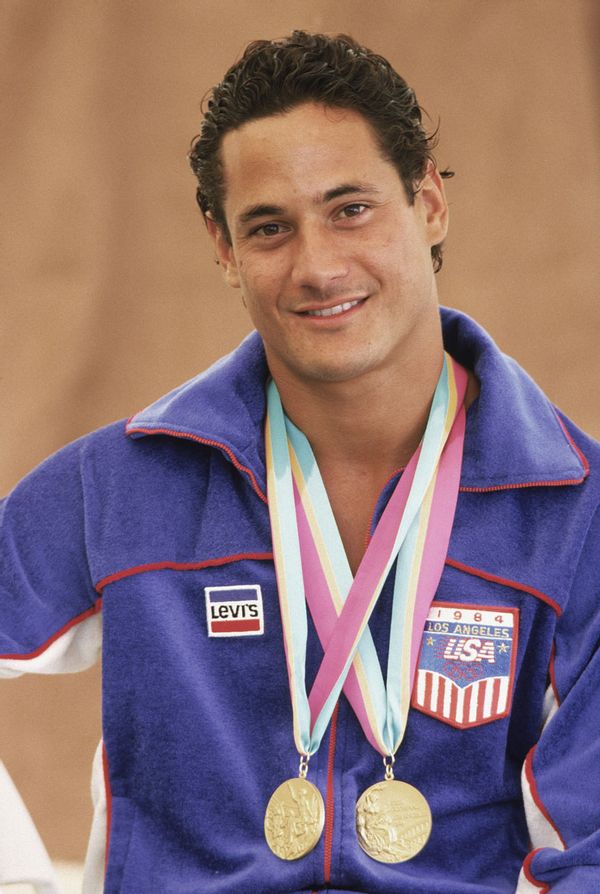 Greg Louganis poses with his two gold medals during the Summer Olympics XXIII in 1984 in Los Angeles. (Focus on Sport via Getty Images)
Greg Louganis poses with his two gold medals during the Summer Olympics XXIII in 1984 in Los Angeles. (Focus on Sport via Getty Images)
To appreciate the magnitude of Louganis’ transformative impact, you need only look as far as those Paris Games. The Chinese team’s masterful domination of the diving competitions (six golds and counting), rooted in its unstoppable combination of precision and grace, has clear precedent in Louganis’ groundbreaking, gymnastic style. “They used me as a model in their diving program,” says Louganis, who trained as an acrobat and dancer as a child before moving to diving. “They pull the kids out when they're very, very young, and introduce them to dance and acrobatics."
"That type of balance and rhythm exposure,” he notes, “are the skill sets that you're going to use and need to become a good diver.”
Louganis’ influence extends far beyond the perimeter of the pool. At the Paris Games this year, there are nearly 200 LGBTQ+ athletes. Three decades ago, Louganis was among just a small handful of openly gay elite athletes in the world. He was also one of the first to disclose he was HIV-positive. As the New York Times grimly reported in 1995, “Louganis now has the dreadful distinction of being the world's most prominent athlete to say he contacted AIDS from homosexual activity.” Now, exactly 40 years after he earned his first gold, his distinctions would never be referred to as "dreadful." And he's back at the Olympics, as an ambassador for Pride House Paris, a space for athletes and fans from the LGBTQ+ community and their allies to celebrate this year's games and socialize.
How did this shy, adopted child, a kid bullied at school for his dark skin, his stutter, his dyslexia and his interest in — and uncanny aptitude for — “sissy” pursuits like gymnastics become one of the most visible and outspoken LGBTQ+ athletes in the world?
Louganis first learned to dive in his family swimming pool. When knee problems ruled out his other athletic activities, diving became his primary focus. By the age of 16, just as he was coming to terms with his sexuality, he was competing in the Olympics. There he earned his first medal, a silver, for the 10-meter platform. The achievement made him instantly renowned. But he says that silver only made him feel like “the first loser.”
"We're riddled with guilt, as gay individuals, because we're told we're wrong."
He remembers the scene in Montreal in 1976. “At the time, I was training with [former Olympic champion] Dr. Sammy Lee. Klaus Dibiase from Italy was going for his third Olympic gold medal,” he says. “The training I was doing was all about beating Klaus, so my sole purpose on this planet was to prevent Klaus from winning that gold medal. I failed, and Dr. Lee let me know that I failed. That was pretty brutal.”
Already prone to depression and suicidal ideation, Louganis’ post-Olympic victory lap was anything but. “I didn't understand when I went back to high school why everybody was celebrating me when I felt like such a failure,” he says. “I was almost a statistic. I tried to commit suicide. I thought the world would be a better place without me.”
There were also rumors about his sexuality, rumblings that occasionally manifested in slurs and offensive signs at his tournaments. The tactics didn't get under his skin, though. “It's easy to point to homophobia, the 'f*g buster' campaign,” he says. “But years later, and meeting up with a lot of these guys, it was more about jealousy. I was winning, and I get it — if you can't beat him on the boards, then you beat him off the boards. So I don't know that all of it was homophobia. I think that a lot of it was just jealousy.”
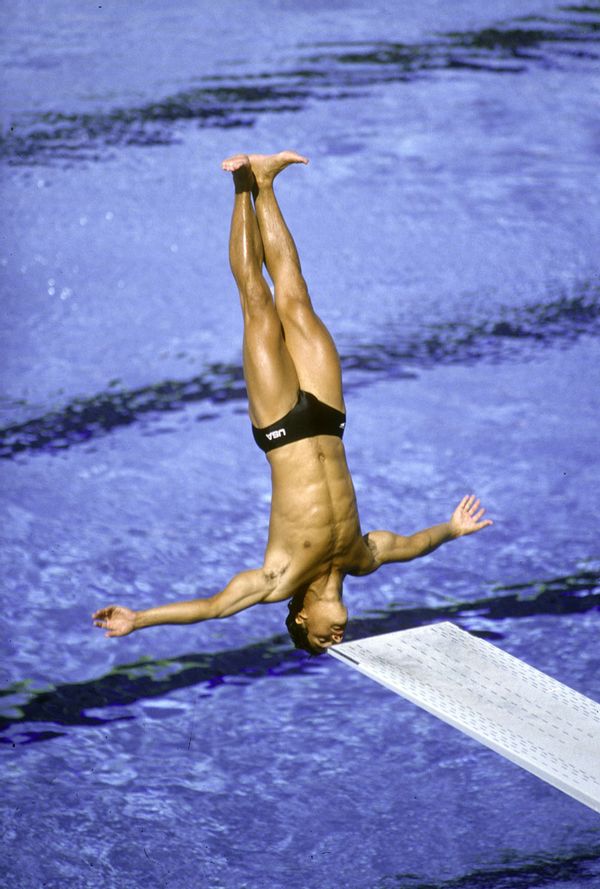 Greg Louganis of the United States competes in the diving competition off the Springboard during the 1984 Summer Olympics in Los Angeles. (Focus on Sport/Getty Images)
Greg Louganis of the United States competes in the diving competition off the Springboard during the 1984 Summer Olympics in Los Angeles. (Focus on Sport/Getty Images)
After sitting out the 1980 Moscow Olympics because of the U.S. boycott, the El Cajon native returned to earn two golds on his home turf at the 1984 Games in Los Angeles. It was meant to be his farewell. Instead, it turned into one of his first acts of advocacy.
“I was supposed to retire after 1984,” he says. “I got my two Olympic gold medals, broke 700 on the 10-meter platform. I went to the nationals and I broke Cynthia Potter's record for national championship titles. I was fully prepared to move on.”
"I was going to pack up my bags, go back to California, lock myself in my house and wait to die."
It didn’t quite work out that way.
Eight years into his Olympic career, Louganis was — like many successful Olympians —a sought-after public figure. But because of International Olympic Committee rules at the time, there were strict guidelines around what they could do and how they could be paid, often leaving athletes financially strapped — an issue that persists 40 years later.
“Edwin Moses [the Olympic gold medalist hurdler] and I were pushing for trust funds for athletes that they can draw on, so they can do commercials, speaking and appearances. That goes into their trust fund, and they can utilize that money for their training and living expenses beyond college. I was a part of that. I was an athlete rep." (Notably, neither Moses nor Louganis received the typical Olympic champion honor of a Wheaties box placement until 2015.)
"After the nationals, I went to [USA diving president] Phil Boggs and said, ‘What's going on with trust funds?’ He said, ‘Well, the only one that it affects is you and you're retiring. So we don't have to spend the money on attorneys to get the trust funds to put it in place.’ I said, ‘Fine, I'm not retiring. Do your f**king homework.’” (The International Swimming Hall of Fame, meanwhile remembers Boggs as the person who “helped create the Athletes Trust fund.”)
“I was really angry,” Louganis remembers. “My intent was to stay eligible until the trust funds were put into place, because I felt that was going to be my legacy. It took two years. In those two years, I found myself at the World Championships, and I won. My coach, Ron O’Brien, said, ‘What are you going to do? It's just two more years.’ That’s how Seoul happened. It wasn't supposed to happen for me.”
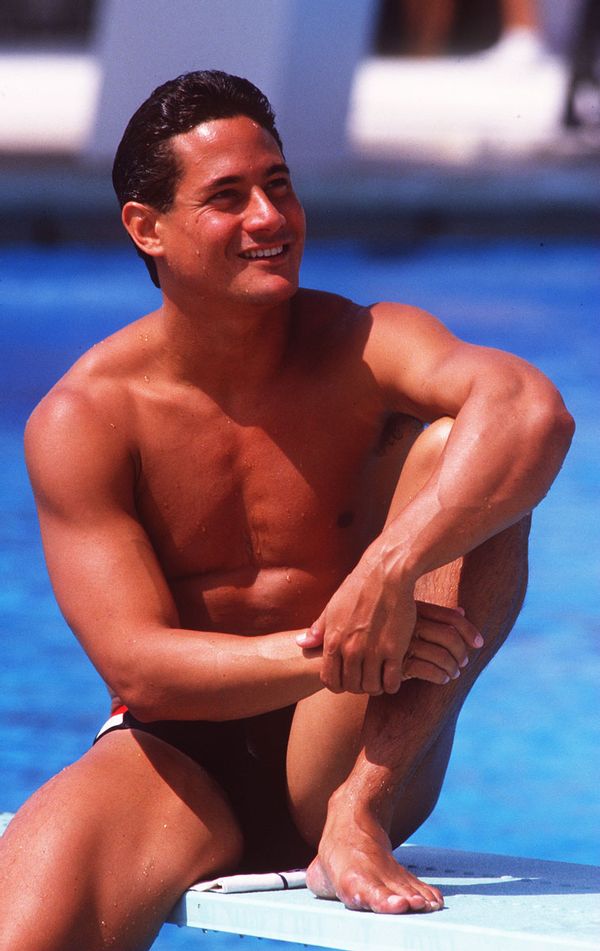 Greg Louganis during the 1987 U.S. National Diving Championships (Getty Images/Tony Duffy/ALLSPORT)
Greg Louganis during the 1987 U.S. National Diving Championships (Getty Images/Tony Duffy/ALLSPORT)
By 1988, AIDS had become a full-blown public health crisis. Louganis had been training in Florida when he got the diagnosis, six months before the Seoul Games. “I was having something going on with my ear,” he says. “I went to the doctor, my cousin who was treating me. When I did the test, my thought was, if I'm positive, I was going to pack up my bags, go back to California, lock myself in my house and wait to die.”
“Because that's what we thought of HIV,” he says.
It’s difficult to express the profound terror and grief of the first several years of the AIDS crisis to those who didn’t endure them. Death felt omnipresent. In cities like New York and San Francisco, cadaverous young men with lesions on their arms and faces were a frequent sight. Sex with a new partner was often a fraught negotiation. And when there were so few treatment options and so much still unknown, when a ravaging virus was in some circles regarded as a convenient excuse for homophobia, disclosure of one’s HIV status could have devastating personal and professional consequences.
"They did say, 'Tone the gay thing down.'"
“In 1988,” he remembers, “our friends in the gay community were dying. We had as many as six, seven, and eight memorials to go to on a weekend. It was crazy. And then, there were people saying, ‘It's killing the right people. It's killing gay men and IV drug users and prostitutes.’ There was a real judgment surrounding it, and also guilt. We're riddled with guilt, as gay individuals, because we're told we're wrong. We get that message, either directly or subliminally, in society.” Louganis would confide his status to only a select number of individuals for seven years.
Coming out to the world at the peak of the AIDS crisis marked a turning point in Louganis’ life. He had been famous since he was a teenager and a sex symbol for just as long, a tousled Californian with a movie star smile. He’d never been closeted, exactly, but he’d been quiet about his sexuality in his early career. And there was a subtle expectation on him to keep it that way. “When I signed on with William Morris Agency," he says, "They did say, ‘Tone the gay thing down."
“I was out to most friends and family,” he says. “My thinking back then was, well, everybody's entitled to a private life. So that was my private life.”
But that private life had an additional, darker dimension — Louganis had spent several years in an abusive relationship with the man who was also his manager, a man who had once raped him at knifepoint. “My view of the world was through the lenses of Jim,” he explains. “I wasn't allowed to go out, unless I had permission. Jim [the late James “Jim” Babbitt] would go, but I wasn't allowed. This is part of an abusive relationship, and also rape,” he notes. “It’s not about the sexual act, it's about control. It's about ultimate control.”
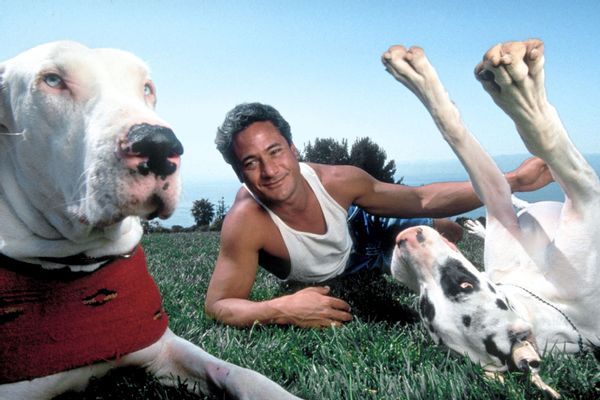 Greg Louganis petting his 2 Great Dane dogs while lying in grass in 1996. (John Storey/Getty Images)
Greg Louganis petting his 2 Great Dane dogs while lying in grass in 1996. (John Storey/Getty Images)
Louganis’ decision to go public about his identity and his diagnosis were undeniable acts of bravery. They were entwined with one of emancipation. “When I was diagnosed HIV-positive, it was like, who else will ever touch me? I thought, OK, I'm stuck. This is it, I’ll make do.” Eventually, though, fed up Babbitt’s mistreatment and the discovery that he’d also been siphoning off most of his earnings, Louganis ended things.
During their personal and professional breakup, Babbitt attempted one last abusive gambit — blackmail. He threatened to call a press conference on Louganis’ HIV status and claim that he was “throwing him out on the street.” As Louganis wrote in his memoir, “He said that people would see me for the selfish, uncaring slut I was.” Louganis had to seek a restraining order, claiming he “feared for his life”. They eventually reached a settlement. Babbitt died of AIDS complications in 1990.
His HIV disclosure, on Louganis’ own terms and in his own time, was met at the time with an outpouring of support and praise around the world, along with some serious backlash. The fact that Louganis had cut himself when he hit his head in Seoul became a particular flashpoint. “It is really regrettable that he competed in the final round of the Olympics if he knew he was HIV-positive,” Seoul Olympic Organizing Committee chairman Park Seh-jik told Reuters in 1995. “It is not morally right, particularly because he was injured and bled.”
Louganis didn’t know the full extent of the controversy until years later. “When my now ex-husband said, ‘They tried to take your medals away,’ I said, ‘What?’’ he recalls. “And he's like, ‘Yeah, back then they tried to take your medals away, because they said you shouldn't have been in Seoul, because they had a travel ban for HIV.’” (Though there was some public discourse about it at the time, the Olympic Committee itself did not move to strip Louganis of his medals.)
"I felt like a throwaway child. […] I found out that she didn't hold me after I was born."
As he moved through his Olympic competition era and into the advocate and mentor phase of his life, Louganis reckoned with deeply rooted self-image issues. Growing up knowing that he’d been given up for adoption and spent his first nine months in foster care, Louganis says, “I felt like a throwaway child.” At 24, he met his birth father, launching a relationship with him, his half-siblings and extended family that he says over time “changed the trajectory of what's family to me.”
He also worked on the anger he felt toward his birth mother. “I found out that she didn't hold me after I was born,” he says, sounding still wounded at the knowledge. “But her parents told her that I was already adopted by a mixed-race couple because they knew I was going to be dark, because my father was Samoan. They were, from the sounds of it, quite racist. She didn't know.” He says now he had "a lot of forgiving to do.”
“Through meditation practice, it came to me that she couldn't give what she so desperately wanted for herself. Then the tears started flowing, because she was scared. She was only 16 when she had me. Then I could feel some compassion and empathy for her. I think that's where a lot of forgiveness comes from. Meaningful forgiveness is to tap into the compassion and empathy,” he says.
He also found similar compassion for his former partner. “I could come to a place of forgiveness,” he says, “because hurt people hurt people. Obviously, there was a tremendous amount of hurt there. With Jim, I wasn't always sure what he said was true. But I think one of the truths that he shared is that he was as a child molested by his stepfather. Just imagine a young boy who didn't feel he had power, and then somebody dominating him like that. That must have been really, really difficult. You're supposed to be able to trust your parents. That trust was broken, so you can understand where it came from.”
He knows it doesn't excuse what Babbitt did to him; it just enables him to move forward from it. “I've also come to learn and accept and realize we can't change other people,” he says, “no matter how hard we try.”
When Louganis first learned he had HIV, he says, “I [sold] my life insurance policy so I could travel and do whatever, because I didn't expect to be here. All these years later, it's like, s**t, I’ve got to get a job. Now what do I do?”
Louganis' energy now is often now devoted to his coaching and speaking engagements, as well as his other career training canines. (In 1999, he published a pet owner's guidebook called "For the Life of Your Dog.") Last year, his put three of his Olympic medals up for auction, hoping to donate a portion of the proceeds to the HIV/AIDS organization Damien Center. “It was obviously a financial thing,” he says candidly, “and hoping to raise money to help the Damien Center so that they could do some good. But also help me out as well.”
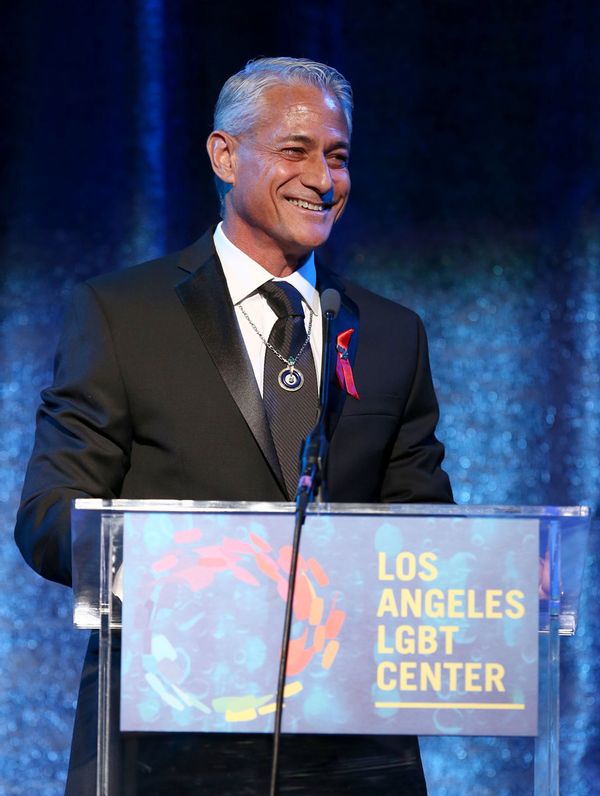 Greg Louganis speaks onstage during the Los Angeles LGBT Center 47th Anniversary Gala Vanguard Awards at Pacific Design Center on September 24, 2016 in West Hollywood. (Joe Scarnici/Getty Images for Los Angeles LGBT Center)
Greg Louganis speaks onstage during the Los Angeles LGBT Center 47th Anniversary Gala Vanguard Awards at Pacific Design Center on September 24, 2016 in West Hollywood. (Joe Scarnici/Getty Images for Los Angeles LGBT Center)
He continues, soberly, “I've fought so many battles. I'm just tired. Tired of fighting. Haven't I accomplished enough? Haven't I made a big enough difference? Can't I just be done? It really is kind of a weird space that I'm in. People say, because I'm 64, 'midlife awakening or midlife crisis?' It certainly feels crisis-y more often than I'd like it to be.”
Soon, however, he rouses himself. “That’s where I'm at now,” he admits. “I am questioning, and trying to figure some things out. Like I said, is this an awakening or crisis? It feels like a crisis so often, and it’s like, ‘Well, what do I do? How can I help others?’ We went to elementary schools that last couple of weeks for Olympic Day, and it was so great to connect with the kids. It's important to have that outreach, and make those outreach points much more available.”
When asked about what he believes will be his legacy, Louganis is reflective. “I think my perceived legacy is obviously diving. And if they remember me as a diver, I hope that I'm remembered as being strong and graceful,” he says. “But my legacy as a person, I would hope people would say I was kind. Making a difference, that's a lot, and it's also very subjective. But kind? You can always be kind.”
"I want to see my records broken. I think that's awesome."
That imperative to kindness comes through in the way Louganis speaks, with a gentle southern California cadence and regular pauses to carefully collect his words. It’s there in the way he cites his dogs as inspiration. “They’re great teachers,” he says. “They don't hold on to resentments. They don't judge. They’re just grateful for whatever they have.”
Louganis is also conscious of his role as an elder statesman, for both the LGBTQ+ community and athletics. He acknowledges that he’s concerned about the threats to LGBTQ+ rights in America, but says, “You can't close up the Pandora's Box, once it's opened. We're not going to go backward. That's ridiculous.” He adds, however, “The divisiveness that it stirs up, and the anger or rage that comes with that, I don't understand it. Why would it threaten you? It's not really, truly affecting you. The thing that concerns me most is the visceral hate and anger, because that's so, so devastating. It's hard for me to understand.”
And when he contemplates this year's Olympics, Louganis offers a unique viewpoint, including his opinions on the current controversies over the use of performance-enhancing resources. “When I was 33, we didn't know what was going on with me,” he remembers. “I was wasting. Growth hormone was helpful to get my energy back up. A lot of the medications that helped me push through some of my treatments, they were actually lifesaving.”
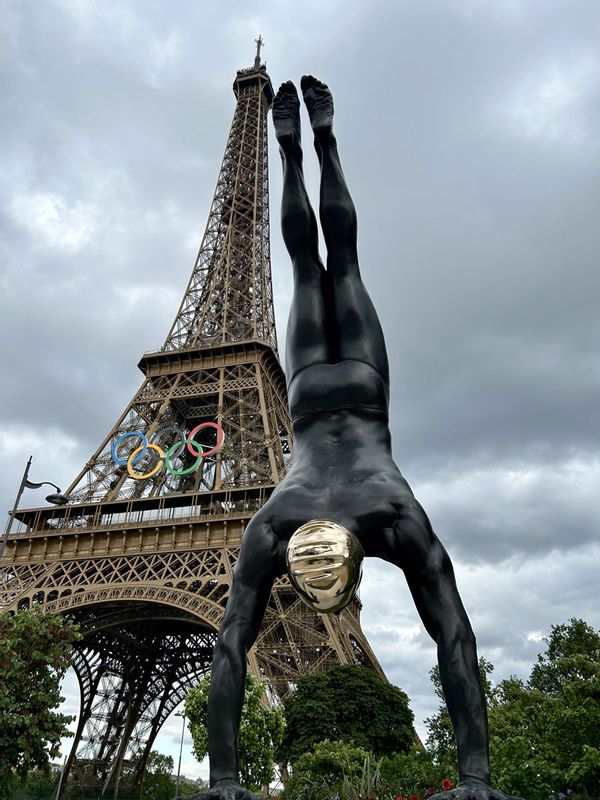 The Diver, a sculpture by U.S. artist Carole Feuerman on display in Paris on July 22, 2024, ahead of the 2024 Paris Olympic Games. Feuerman was inspired by U.S. diver Greg Louganis, a four-time Olympic medalist at the 1984 and 1988 Olympic Games. (Christophe DELATTRE / AFP)Louganis notes, “When somebody says, ‘What if your records are broken, and you find out that they're juicing, or taking something?’ I want to find out what they're taking! That's great. I want to see my records broken. Whether they do that aided by something, it wouldn't matter to me, personally, because I think that's awesome. Because then we find great information."
The Diver, a sculpture by U.S. artist Carole Feuerman on display in Paris on July 22, 2024, ahead of the 2024 Paris Olympic Games. Feuerman was inspired by U.S. diver Greg Louganis, a four-time Olympic medalist at the 1984 and 1988 Olympic Games. (Christophe DELATTRE / AFP)Louganis notes, “When somebody says, ‘What if your records are broken, and you find out that they're juicing, or taking something?’ I want to find out what they're taking! That's great. I want to see my records broken. Whether they do that aided by something, it wouldn't matter to me, personally, because I think that's awesome. Because then we find great information."
Many in the field dissent with Louganis' view, particularly supporters of the World Anti-Doping Agency (WADA), an independent agency created to “fight against doping in sport,” a problem it describes as “a scourge.” But WADA has come under fire this summer, with pushback against its ruling over Chinese athletes revealing how far from black and white the metrics of testing, and ideas of what constitutes doping, can be.
Louganis says, "I'm not fully on board with the whole WADA thing. We’ve demonized it as cheating. Well, what if it wasn't cheating? The drugs aren't showing up to the training sessions; the athlete is putting the work in. I know it's not a popular stance, but it's just my own personal awareness. The key is, if we're talking about it, if we have open communication about it, then it can be safe. As long as we demonize it, and it's in the shadows, then that's where a lot of things can go awry, because they're trying to hide it. If we're truly open about it, and really helping each other, then it could be terrific information that we gather to help the quality of life of others.”
And while the current crop of very young competitors in Paris has raised questions about age limits and concern over pushing kids too hard too soon, Louganis likewise offers another perspective. For him, finding the diving board at an early age was salvation.
“I think a lot of people try to convince me that I sacrificed my childhood. But one thing that my mother was always very clear with me is that we are a product of the decisions that we make, no matter how you come to make those choices. So I always took responsibility. I didn't lose out on a childhood. I did exactly what I wanted to do, was meant to do and was destined to do.”


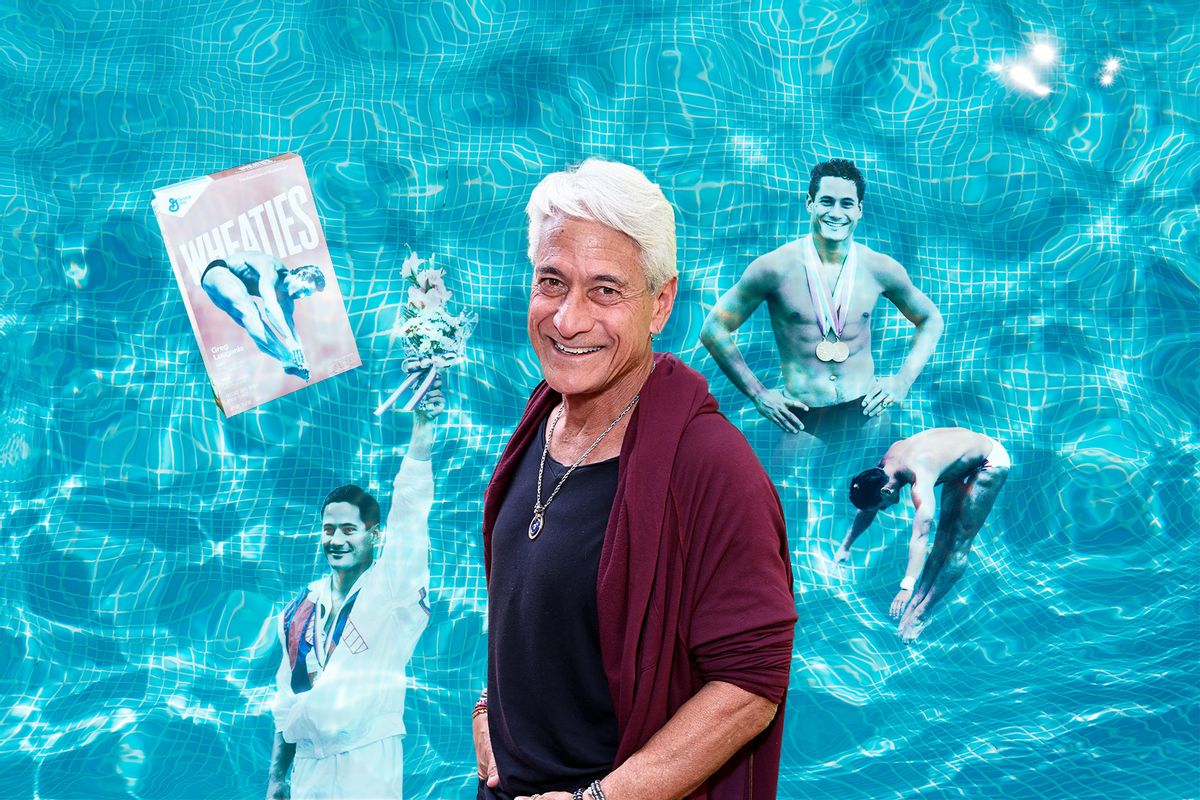
Shares